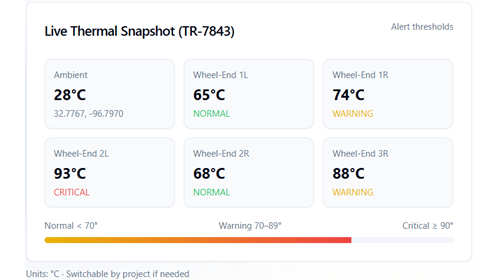
/
July 1, 2024
/
#
Min Read
Enhancing Fleet Management with Advanced RBAC and Analytics Technology
In the digitized landscape of modern fleet management, leveraging cutting-edge technologies and sophisticated role-based access control (RBAC) systems is imperative. Advanced fleet management not only streamlines operations but also fortifies data security and ensures adherence to evolving regulatory standards. Through the integration of comprehensive solutions like Sibros' Deep Connected Platform, fleet operators can harness detailed insights and operational efficiency on an unprecedented scale.
Comprehensive Role-Based Access Control for Fleet Management
RBAC is crucial for securing sensitive fleet data and operational capabilities, ensuring that access is granted based on roles defined within the organization. This method not only bolsters security but also enhances operational efficiency by aligning access permissions with user responsibilities.
RBAC System Design and Implementation
RBAC systems are designed to support dynamic access control through a scalable and flexible database architecture. This system allows for the definition of specific policies that dictate the permissible actions on various resources within the fleet management dashboard. For instance, policies may define who can create and update vehicle software configurations, or approve and start campaigns.
Each role in the system encapsulates a set of policies, where each policy represents an allowable action on a specific resource. Users are assigned roles that grant them a collection of these policies, effectively defining their access scope within the platform. Initial implementations focus on integrating the RBAC to efficiently manage user-system interactions. This approach includes hiding or displaying UI elements based on the user's roles. For example, if an automaker has two clients with separate fleets, they can define which data each of the two can access through RBAC to ensure confidentiality and data privacy among their customers.
When implementing an RBAC solution, one must also consider scalability, particularly the increased complexity that comes with managing a growing number of users and permissions. The system design must use a robust database schema that supports extensive querying and policy management without performance degradation.
Analytics for Fleet Tracking and Management
Sibros’ RBAC system is meticulously designed to integrate seamlessly with other enterprise management systems, ensuring a unified approach to access control across all platforms. This integration is pivotal for maintaining consistent access controls and secure data flow between systems, effectively eliminating data redundancy and potential conflicts.
Additionally, the RBAC system bolsters security through stringent access controls and comprehensive audit trails for all data. These features are crucial for adhering to international compliance standards such as GDPR, which requires appropriate technical and organizational measures to protect personal data from unauthorized access.
Moreover, the automation of role assignment and management within this system plays a critical role in enhancing operational efficiency. By automating these processes, the system significantly reduces administrative overhead while simultaneously improving the accuracy and responsiveness of access control. This streamlined approach ensures that default permissions for new features are managed automatically, safeguarding sensitive features right from the outset.
Benefits of RBAC and Analytics in Fleets
Sibros’ solutions support RBAC and critical analytics that are essential for modern fleet management.
Real-Time Fleet Monitoring: Using Sibros' Datascope and Deep Insights tools, fleet managers can monitor vehicle status, track location in real time, and analyze performance data across the fleet. Fleet managers can leverage this for optimized dispatching and load balancing, which improves overall fleet efficiency.
Advanced Analytical Tools: Sibros' platform leverages advanced analytics to enable predictive insights, such as identifying potential vehicle failures before they occur. The system provides access to historical and real-time data, which can be utilized to forecast maintenance needs, reduce unplanned downtime, and extend vehicle lifespans.
Predictive Maintenance: For electric fleets, fleet managers can monitor charging behavior that allows them to detect and diagnose charging interruptions during off-peak hours. This capability ensures that EVs are charged and ready for operation, maximizing fleet availability and efficiency.
Using RBAC and Analytics to Elevate Fleet Operations
The integration of sophisticated digital technologies and robust role-based access control systems such as those provided by Sibros is revolutionizing fleet management. By adopting these advanced solutions, fleet operators are not only enhancing operational excellence but also improving security and regulatory compliance. As the landscape of fleet management continues to evolve, the strategic application of these technologies will be crucial in maintaining a competitive edge and achieving operational excellence. To learn more about how Sibros can help drive your fleet into the future, contact us today.






-min.png)



